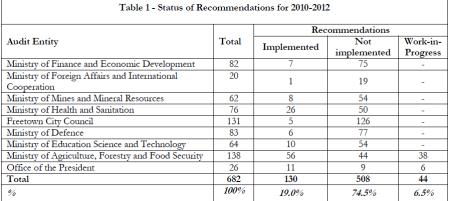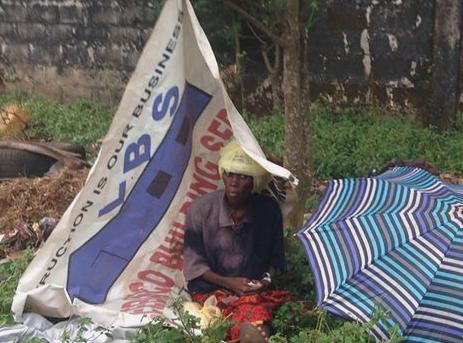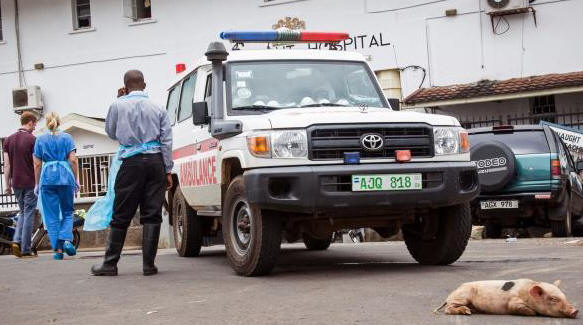Monday
December 22, 2014
- The audit report for 2013 is out and its the
same old rot. The rampant thieving of the
people's money, the lack of accountability, a
determination to flout all financial rules and
regulations and through it all - the thieving
hands of the rat and his gang of looters of
state coffers.  The 2013 audit report into the accounts of the Sierra Leone government as well as associated institutions is now out and it does not make good reading for all those wishing the country well as instances of massive financial irregularities are laid bare by the Auditor-General Mrs Lara Taylor-Pearce. One would have believed that given the various recommendations made in previous audit reports, those controlling the purse strings of the peoples' resources would have mended their ways and would have done the right thing as required by the country's financial regulations, orders as well as the Constitution. This audit report has a special focus on the country's procurement methods - rules of procurement as against what obtains on the ground with these provisions aimed at giving true stewardship of how the peoples' resources are managed/mismanaged. Indeed in the introduction to this year's report which has been given a qualified "except for" opinion, the Auditor-General has stated - "It must be noted that the various issues giving rise to my qualified ‘except for’ opinion are very serious in terms of their effect on the accounts, and need to be dealt with urgently. Unfortunately, they serve to further confirm the government’s widely held reputation of being unable to decisively deal with poor public financial management. Our public servants could and should do better. As I have said before, with a stronger commitment and willingness to address public financial management reform and strong enforcement of existing well-established laws and regulations, the matters could be put right quickly as other countries have done. That is the responsibility of the government and all public officials. Parliamentarians, Ministers and public sector managers at all levels need to provide leadership in not accepting petty and grand corruption as normative. Those in position to do so should follow the money when things go wrong. As citizens, none of us should ever accept fiduciary irresponsibility from those charged with holding the strings of the public purse. To do so is morally corrosive, erodes our civic rights and damages our hard-won young democracy." This year's report on the government's finances in 2013 also directs the spotlight of probity and accountability on previous such reports and the fate of recommendations made by the Auditor-General where financial malfeasance had been detected and moves suggested as to how to put a stop to such financial impropriety in the handling of the peoples' resources. It shows a lack of leadership and the deliberate action of government operatives - from State House to ministries and associated organs of governance - to ignore findings included in the audit reports. In a section headed - Follow-up on Previous Recommendations, the report notes - "Almost without exception our observations and recommendations are not being given the attention they deserve or that Parliament, citizens and international donors have a right to expect. For example, Freetown City Council has implemented less than 4% of our recommendations and, from the nine entities reviewed, another three have implemented less than 10%. Overall only 19% have been implemented. In absolute numbers, for the three years 2010 to 2013 there were 682 recommendations for the nine entities of which 130 were implemented, 508 were not implemented and 44 are in process. There is a clear pattern of ASSL repeating observations across all the audit entities we reviewed. The areas of repetition relate to basic tenets of public financial management and compliance with the laws of this country. Dereliction of duty by public officers in question are largely in the following areas: Cash management and internal control; Compliance with procurement laws and regulations; Basic records maintenance of an administrative and financial nature; and Protection of assets.
"A total of Le9.2 billion was identified as procurements undertaken by various Ministries, departments and agencies (MDAs) for the supply of goods and services for which procurement procedures were not followed. An amount totalling Le13.3 billion represented procurements carried out but certain salient documents such as performance bond, GST returns, and contracts documents were not submitted upon request. An amount of Le1.64 billion out of a total contract price of Le2.3billion was paid before signing of the contract for the supply of 99,477 yards of uniforms by the Ministry of Health and Sanitation. The payment date preceded the contract date. There you have it - money is paid out of the peoples' purse to contractors even before contracts are signed - clearly a well-oiled criminal enterprise that could well be encouraged from the corridors of State House where the puppet master, the rat that is, has his filthy and thieving paws in all things government - from the appointment of Chairmen/women of Boards to those who get to sit on the Boards thereby rendering the independence of these institutions a fairy tale. One could clearly discern the frustrations of the office of the Auditor-General when every year, after pointing out anomalies that must be corrected including the payment of monies not accounted for, the same corrupt practices get repeated all the time. "It is my view that the action of the executive arm of government towards the implementation of the recommendations outlined in this report and others in the past when debated and approved by parliament has not been very effective in achieving the goals of public financial management reforms in this country. It is my fervent hope and belief that the executive and parliament would collaborate with the Auditor-General in making sure that those who are charged with the implementation of programmes and/or projects adheres to the constitutional and statutory provisions aimed at directing public financial management so as to achieve enhanced transparency, accountability and good governance. This will ultimately build trust in public officials, institutions and systems responsible for effective financial management. I have again in this report drawn attention to several instances of non-compliance with financial and other regulations, as well as errors that occurred in the processing of transactions. These are the results of systemic weaknesses that have persisted over time and other break-downs in internal controls. I have provided recommendations which, if implemented, can serve to reduce the incidence of the irregularities and correct the causes of the conditions I have reported on." The audit report has noted that there seems to be an improvement in some areas of banking the peoples' money with attempts being made to reconcile what is on paper and what is actually in the banks under the heading - cash and bank - "There has been a considerable improvement in terms of the number of audit confirmations of balances received from commercial banks. We received direct confirmations from ten out of twelve commercial banks disclosed in the account. The total of Le157.30 billion was presented as cash and bank balances with commercial banks for the year 2013. This shows that three more bank balances were disclosed in 2013 as opposed to nine bank balances that were disclosed in 2012. We noted discrepancies between the confirmed bank balances and the disclosures in the public accounts. For instance, we noted that a total credit balance of Le 135.6 billion and a total debit balance of Le3 billion were included in the accounts but were not confirmed by the respective banks. Out of Le135.6 billion, an amount totalling Le1.1 billion relates to departmental account balances as per Accountant General records but it was not in the list of Bank of Sierra Leone’s bank balances. Furthermore, we observed
that total credit balances of Le123.2 billion
and an overdrawn balance of Le3.06 billion were
confirmed as per bank confirmation letters of
the respective banks, but this was not part of
the ledger account balances that were recorded
in the public accounts. In their response, they
explained that some of these accounts are those
of local councils, parastatals, National Revenue
Authority transit accounts and those of
sub-vented agencies which were reported after
the preparation of the account. Upon
verification of their responses, the credit
balance of Le101.6 billion and a debit balance
of Le3.06 billion remained outstanding.
We had on our pages highlighted excerpts emanating from the Auditor-General's report and noted that one area that needed the necessary financial and reporting procedures in line with the law and the Constitution was in the area of health - the health of the people. Indeed had previous audit report been heeded and acted upon, the calamity, the affliction, the sinister and malevolent Ebola Virus Disease would not have impacted upon us so badly. If the rat and his cronies at State House had for once put aside the smoke and mirrors facade and concentrated on the health of voters, non-voters and all who reside within the borders of an entity called Sierra Leone, the Ebola Virus Disease menace would not have spread to rapidly decimating lives, communities and all who stood in its path of destruction. Here's what the audit report for the Ministry of Health and Sanitation says - MINISTRY OF HEALTH & SANITATION HQ(2013) - Inconsistency In Contract Implementation For Uniforms. "According to the contract awarded to Fife International for the sum of Le2,320,000,000, the following were observed. The Contractor was to supply 77,600 yards of white uniform materials. However a balance of 21,877 yards valued at Le437,540,000 were yet to be supplied. The special conditions of the contract stated that, an advance payment of 30% should be made after signing the contract and the remaining 70% on acceptance of delivery. The contract was however signed in November, 2011 and the delivery period was sixteen weeks from the date of signing the contract. The audit team also noted with great concern that the dictates of the contract agreement were not followed as the contractor had already been paid Le1,644,100,000 representing 71% of the contract price, 41% in excess of what should have been paid before completion of delivery. It was recommended that the PS must substantiate the 41% payment in excess of what should have been paid. The thieving band of looters of state resources do not have any moral compass when it comes to making money from whatever source and at whatever cost. Here's this observation on the Free Health Care programme - Procurement Of Non-Essential Drugs Drugs (Calibenclamiride/Glibenclamide?) valued at $36,312 were procured under the Free Health Care. They were however not normally prescribed for free health care patients. It was recommended that in future, all stakeholders and end-users should be involved in the needs assessment process. The PS should also explain why non-essential drugs costing $36,312 were bought under the free health care and ensure that those drugs were distributed to hospitals and peripherals where needed. The requisition or request letters did not indicate the quantity and description of the items needed by the end-users in respect of payments which totalled Le684,370,000. It was recommended that in future all requests from end-users should be specific with regards to the items needed. The Head of the Procurement Unit should explain why the end-users did not provide details of items required, within thirty days of receipt of the report. Furthermore, in future, all requisition should indicate the quantity and description of items needed." As any man-jack in Sierra Leone would know, these are the drugs that would eventually end up on the shelves of "pharmacies" and doctors' practices - drugs that were procured under the Free Health Care scheme but which were never prescribed for free for the ordinary folk. Freetown's main referral hospital, the Connaught Hospital has again come under scrutiny and one would recall recent pictures of that institution during the Ebola Virus Disease outbreak with pigs roaming freely. "Non-functional oxygen plant and insufficient oxygen concentrators - The oxygen plant procured in 2006 to provide 100% oxygen to patient at the hospital was non-functional since its delivery. It was also observed that there were four oxygen concentrators located in the intensive care unit and the annex wards with capacity to produce only 30% oxygen to serve the entire hospital. It was recommended that the Chief Medical Officer and the Director of Drugs and Medical Supplies should put the oxygen plant into operation within thirty days of the receipt of this report otherwise the cost of the plant must be refunded. Poor Environmental and Sanitary Provision In The Hospital - Even though the amount of Le309,201,060 was paid to AFWEN (SL) for the cleaning of the hospital, it was observed that the outpatient unit emitted a strong offensive odour which could be hazardous to the hospital visitors. It was also observed that the hospital was infested with pests and the sanitary facilities in the wards were unsatisfactory. It was recommended that the Hospital Care Manager and the head of the environmental unit should endeavour to improve the environmental and sanitary situation of the hospital within thirty days from the date of receipt of the report, otherwise, the contract should be revisited. Drugs Not Accounted For - Free Health Care drugs worth US$47,849 supplied to the hospital were not properly accounted for. In addition, stock data reports were not submitted for audit inspection with respect to cost-recovery drugs worth Le256,598,844 supplied to the hospital by the Central Medical Stores and also management drugs worth Le387,674,660 procured by the Freetown City Council. Data or reports on the quantity of drugs sold and unsold were not submitted for inspection. It was recommended that the Pharmacist should provide a comprehensive list and all relevant supporting documents on the issuance of the drugs and make them available to the audit office for verification within thirty days of the receipt of the report. Otherwise, the amount should be refunded. It was recommended that the Pharmacist should provide a report on the status of the cost-recovery and the management of drugs within thirty days from the date of receipt of the report, and evidence forwarded to the audit office for verification. Otherwise, the matter would be further investigated. The Pharmacist and Storekeeper should also make appropriate arrangements for the store to be conducive for the storage of drugs. But what about the Princess Christian Maternity Hospital, the PCMH or Cottage Hospital in the east of the capital - an institution that was once the pride of Sierra Leone's health delivery system before the vultures took residence at State House? Here's a peek into the horror that now exists and all this before the Ebola Virus Disease struck. Interviews conducted with the Nurse-in-Charge of the ward, revealed that the number of delivery beds in the labour ward were not sufficient to meet the increased number of in-patients. In addition, there was no running water in the ward; gloves and vacuum extractor were also insufficient in the ward. Vital or essential equipment needed for the effective, efficient functioning of the Eclamptic ward (ward 2) were not adequate. Blood-pressure machines, albustic protective gears, glucose machine/strip mattresses and running water were inadequate. Interview with the Sister-in-Charge revealed that some of those vital equipment purchased were of poor quality. Of the 115 beds 119 required in the various maternity wards, only 23 were with baby cots. This gave rise to newly born babies sharing beds with their mothers. Oxygen plant procured in
2006 to provide 100% oxygen to patients at the
hospital was not functional since its delivery
(8 years after its delivery). There were only
two oxygen concentrators to serve the entire
hospital.
Electricity at the hospital continued to be a challenge in the absence of regular power supply from the National Power Authority (NPA). Even though the Ministry of Health and Sanitation provided the hospital with a 150 KVA generator which costed $136,000 in 2013, it still had not been installed (18 months after delivery). The only available ambulance in the hospital was not roadworthy. Patients had to resort to the use of commercial or private vehicles on emergency or referral cases. It was therefore recommended that the Director of Training, Hospital and Laboratory Services should ensure that the labour and eclamptic wards were provided with the basic facilities within thirty days of the receipt of the report. In addition, he was to ensure that additional baby cots were provided for the hospital in order to solve the problem of baby-mother bed sharing and explain why substandard equipment were provided to the hospital. He was to provide documentary evidence of items procured within thirty days from receipt of the report. Kindly take a look at what the audit report has on another institution - the Ola During Childrens' Hospital - High Infant Mortality Rate - The infant mortality rate in the hospital was high. Out of 11,023 admissions, 1,226 deaths were reported in the hospital, representing 11.1% of inpatients admitted. It was of utmost concern that 50% of the death cases occurred within the 24 hours of treatment or admission. It was recommended that the Chief Medical Officer should assign more doctors to the hospital to meet the increase in the number of patients. It was observed that the laboratory lacked the following equipment: Microscopes; Fully automated biochemical analyser; Gas analyzer for respiratory diseases; Automated haemoglobin analyser; Elisa tests kits and reader machines for testing typhoid fever, and hepatitis B; Machine for molecular diagnostic; and Reagent for the determination of protein in urine. Wards - Intensive and Special Baby Care Units - It was observed that as a result of the Free Health Care Program, the intensive and special baby care unit wards were overcrowded with admission cases. It was strange to note that there were instances where two patients with different ailments were using a single bed. Based on physiological guidelines, a canister of supplementary oxygen (02) should be administered to one patient at a time. It was however observed that several patients suffering from diverse ailments were concurrently using one oxygen canister at the same time. It was also observed that because the incinerator was operating below the required temperature, it could not effectively burn waste products especially sharp items, used needles and glasses. That had resulted in the emission of noxious fumes. There was also spillage of waste behind the incinerator. If you think that is gross negligence of a criminal nature, then take a look at this - KINGHARMAN ROAD HOSPITAL (2013) - Inadequate Supply of Essential Equipment and Other Facilities - There was inadequate laboratory equipment to carry out diagnoses or test as the laboratory had no microscope, cell-washers, sterilising pot, delivery kits and gloves; Interview with personnel in the theatre revealed that there were no suction machines and the only monitoring machine used for monitoring patients’ vitals was not in good working order for over a year; The ceiling and standing lights in the theatre were faulty; The number of beds and bedding accessories in the various wards were insufficient; The number of rooms/wards in the hospital did not accommodate the increase in the number of patients. Therefore patients had to be admitted along the corridor of the hospital, thereby compromising the patients’ dignity and privacy; There was no ambulance in the hospital; Relatives of patients had to resort to the use of commercial vehicles in emergency and referred cases. There was only one (1) porter to serve the entire hospital. As a result, there was no porter to provide support to nurses on night duty; There was no blood bank in the hospital. Patients had to be referred to the Connaught hospital to secure blood; and there was no wheelchair in the entire hospital to assist critically ill and physically challenged patients to move around the hospital. We have highlighted some aspects of the health delivery system so that donors and all those wishing well for Sierra Leone could see just how dilapidated the country's health delivery system had been even before the Ebola Virus Disease struck. We are therefore appealing to all of them including those concerned Sierra Leoneans and friends of the country within and outside Sierra Leone to please help otherwise, given the lack of commitment of government operatives to the health of the poor and unconnected, another disaster is just waiting to happen. And one more thing - please, please do not allow the paws of the rat and other vermin pillaging the country's coffers to have access to any resources lest they be converted in the desperate, morally bankrupt and shameless competition for personal enrichment.
|


 In
the area of procurement - getting goods and
services that government operatives say are
needed for the efficient running of government
machinery in accordance with good financial
principles and management, the audit report
states -
In
the area of procurement - getting goods and
services that government operatives say are
needed for the efficient running of government
machinery in accordance with good financial
principles and management, the audit report
states - 
